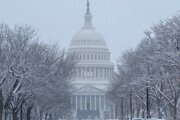MADISON, Wis. (AP) — Republicans emerged from Tuesday’s elections still in complete control of the Wisconsin Legislature, overcoming new district boundaries that Democrats had hoped would give them a chance at finally making major inroads in both chambers.
Voters also approved a GOP-authored constitutional amendment that bars foreign nationals from voting in Wisconsin.
Here’s a look at what was at stake for the Legislature and the Republican-authored constitutional amendment designed to ensure only U.S. citizens can vote in Wisconsin:
Wisconsin Legislature
As of early Wednesday morning, the GOP had held six of 10 Republican Senate districts up this cycle, ensuring themselves of at least an 18-seat majority. Democrats managed to flip one district, ending the GOP’s 22-seat supermajority and preventing Republicans from overriding any vetoes from Democratic Gov. Tony Evers.
Democrats had better luck in the Assembly, flipping a handful of districts, but it wasn’t enough. As of early Wednesday morning Republicans had still amassed at least 50 seats, guaranteeing them control.
The GOP has controlled both chambers for most of the last 13 years. They’ve used their majorities to neuter public employee unions, legalize concealed weapons, scale back diversity initiatives and tighten voting rules.
Democrats had hoped this election cycle would be different after liberal justices took control of the state Supreme Court in 2023, clearing the way for Evers to draw new district boundaries that spread out Republican voters.
Citizenship voting amendment
Wisconsin voters approved a constitutional amendment in Tuesday’s elections that prohibits foreign nationals from voting in the state.
“Voters have delivered an unmistakable message: Wisconsin elections will be decided by U.S. citizens, not far-left activists who would turn the ballot box into a petri dish for extremist policies,” state Republican Party Chair Brian Schimming said in a statement.
Republicans across the country have been pushing voters to adopt constitutional amendments that explicitly prohibit non-U.S. citizens from voting. The move was spurred by the District of Columbia and municipalities in California, Maryland and Vermont allowing non-citizens to vote in local elections.
The Wisconsin Constitution states that every U.S. citizen who is at least 18 can vote. The amendment revises that language to read that only U.S. citizens can vote in federal, state and local elections held in Wisconsin.
The amendment was on the ballot in seven other states besides Wisconsin this cycle, according to Ballotpedia. North Dakota, Alabama, Florida, Colorado, Ohio and Louisiana have already adopted it.
Democrats contend the measures could create hurdles for legal voters and lead people to believe that the problem of noncitizens voting is bigger than it really is. Data from states indicates that voting by noncitizens is rare, although Republican officials in Alabama, Georgia, Ohio and Texas have highlighted voter registration reviews that turned up potential noncitizens.
Copyright © 2025 The Associated Press. All rights reserved. This material may not be published, broadcast, written or redistributed.







